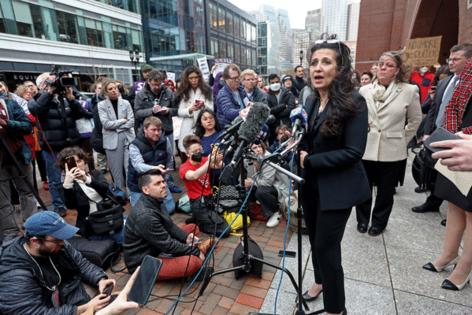Commentary: There's no neutral language to describe horrific actions
Published in Political News
Language is far less neutral than we usually think it is: Questions can be leading and words can be biased, and they are more likely to be biased the more controversial the topic. In general, attempts to manufacture neutrality in language result in the opposite effect. If something horrific is happening, describing it with euphemisms becomes an endorsement of the horror itself.
In recent months, the second Trump administration has become notorious for sending masked plainclothes agents without warrants to apprehend U.S. residents outside the judicial system, and for sending them overseas and claiming to have no authority to bring them back when ordered by the Supreme Court to do so.
In cases like these, then, what’s a neutral observer to do? How can someone like a journalist or a judge aim to be apolitical rather than partisan when discussing these actions?
Some words and phrases can be neutral and unbiased, such as “prime number.” There’s really only one term for a prime number because its meaning (a number divisible only by one and itself) couldn’t be more straightforward or innocuous. There isn’t more than one take on what makes a number prime, so we don’t need more than one term for the concept.
At the other end of the spectrum are issues so volatile that neutral language is almost impossible. There are many terms for supporters of the rights that were guaranteed by Roe vs. Wade, and many terms for those who opposed the ruling. The label “pro-choice” implies others are “anti-choice”; the label “anti-abortion” implies others are “pro-abortion.”
Linguists and philosophers who study meaning have long appreciated that any given word has a literal or explicit meaning alongside a more elusive, implicit meaning.
The original example from German philosopher Gottlob Frege contrasted “dog,” a neutral term, with “cur,” a sort of canine slur. Other pairings have positive implications for one and negative for the other: Is that task a “challenge” or a “slog”? Are those demonstrators “fostering” an uprising or “inciting” one?
Word choices can also be used to reinforce or undermine the legitimacy of government, because when it comes to acts of force, we generally have certain terms that we use when we consider the act to be lawful (such as “arrest” and “execution”) and other terms when we consider the act unlawful (such as “kidnapping” and “killing”). None of these terms are neutral; they all carry a legal judgment, and it’s very hard to find a way to characterize acts of force that doesn’t.
The philosopher H. Paul Grice observed that directness of form corresponds to directness of meaning; the use of a roundabout euphemism to replace a direct word amounts to shifting from a direct meaning to an indirect one, not shifting from a direct meaning to a neutral one.
Direct words like “kill” or “break” often imply directness of action, possibly because their indirect, wordy counterparts (“cause to die” or “cause to break”), by virtue of their indirectness, imply the act was done accidentally. This is one reason the euphemism “officer-involved shooting” is widely and plausibly interpreted as nonneutral wording that often inaccurately eliminates any suggestion of agency on the part of the officer.
So language is full of biased terms, especially pertaining to controversial topics, and attempts to avoid these terms result in their own bias. What are the linguistic options for someone who wants to remain morally or legally neutral while describing or reporting controversial acts such as the federal government’s recent immigration actions? How can one do so without emphasizing the administration’s lawlessness (as a Trump critic might), or without playing down the lawlessness (as a Trump defender might)?
The simple answer, from the point of view of semantics, is that such a thing is practically impossible: Language generally does not afford us the ability to describe controversial and high-stakes circumstances without also implicitly weighing in on them. Different languages differ in their lexical inventory, sure — there are languages that have innovated words for concepts that other languages generally don’t have — but there is also a general tendency toward biased terms for controversial topics. This is not a necessary property of language, but a reflection of how we tend to think about the world.
This message is nothing new: Journalists have long been warned that objectivity is an impossible ideal, and there has been support from social movements and political science scholars for the claim that being “apolitical” amounts to a political stance in support of existing power imbalances and injustices.
As with most things in life, choosing to not take a side amounts to taking a side, and the same is true with language use. The sooner we can come to terms with this linguistic reality, the sooner we can start to grapple with our sociopolitical reality, which is in shambles.
____
Jessica Rett is a professor of linguistics at UCLA. Her research investigates the meaning of words and how they contribute to the meanings of sentences, either in isolation or in broader contexts.
_____
©2025 Los Angeles Times. Visit at latimes.com. Distributed by Tribune Content Agency, LLC.




























































Comments